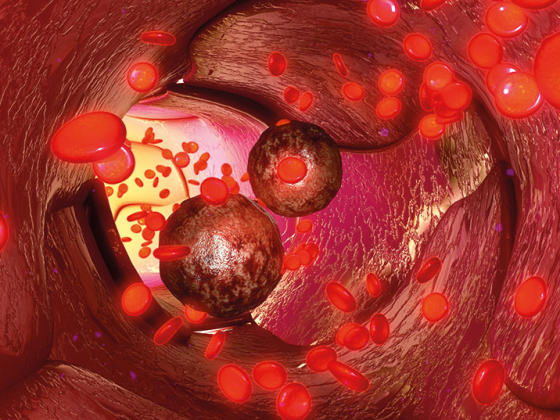For about a year now, the COVID-19 pandemic has been shaping daily life in most medical and social settings. Among the multitude of pandemic aspects affecting the daily lives of dermatologists, questions have been raised about how to proceed with the therapy of systemically acting drugs and the finding that skin cancer incidence rates have declined but tumor thickness has increased in newly diagnosed cases.
Nowadays, severe skin diseases can be successfully treated with system-modulating or system-suppressive drugs, and if skin tumors are detected in time, there is a wide range of treatment options. However, the coronal pandemic has had a significant impact on these indication areas and has led to great uncertainty.
Conclusion so far: do not discontinue system therapy lightly
“In corona infections, the activation of the immune system plays a role, although it cannot be said across the board whether more or less of an immune response is good,” says Prof. Tilo Biedermann, MD, President of the German Dermatological Society (DDG) [1,2]. Many patients with dermatological diseases benefit from treatment with biologics that slow down the overreacting immune system. Experience and studies after one year of corona pandemic reinforce the assumption that for the vast majority of patients there has been little or no effect on the immune response to the virus. Prof. Dr. med. Peter Elsner, public relations officer of the DDG, assesses the situation as follows: “An effective and indicated therapy of an underlying disease should not be discontinued or paused lightly and can be maintained in most cases without major concerns” [1]. However, there is still no valid answer for all systemic therapy options and patients as to whether a treatment should be continued unchanged. “In the case of neurodermatitis, for example, not all therapies are to be evaluated in the same way. Drugs that specifically reduce the misdirected so-called type 2 immune response have a positive effect against the viral infection,” explains Prof. Biedermann [1]. On the other hand, immunosuppressive drugs such as glucocorticoids, cyclosporine, azathioprine or methotrexate carry certain risks. The DDG president advocates an individual decision as to whether the therapy should be maintained, changed or adapted. “Any change must always be weighed against the background of a possible worsening of the underlying disease and thus a risk to patients,” said Prof. Biedermann [1].
Skin cancer incidence figures declining, but increase in tumor thickness
Canceling or postponing dermatologist appointments can have serious implications for early detection of skin cancer. Numerous studies describe the decline in diagnosis of skin tumors since the onset of the pandemic. According to an international survey of dermatologists by the International Dermoscopy Society (IDS), significantly fewer cases of non-melanoma skin cancer and malignant melanoma were diagnosed during this period [3]. A retrospective study published in Cancers 2021 with data from more than 100 000 patients from 1660 practices concluded that skin tumor diagnoses decreased by 25.6% in March 2020 and as much as 42.9% in April 2020 in dermatology practices and by 19.6% in March 2020 and 29.3% in April 2020 in general practices [4]. Data logging the progression of tumor thicknesses indicate that the reasons for reduced incidence numbers are not an effective decrease in new skin cancer cases, but that patients avoided dermatologist visits, thus delaying diagnosis [5](box). The consequence of this is that the prognosis of those with the disease deteriorates considerably.
|
A study published in the Journal of the European Academy of Dermatology and Venereology (JEADV) showed that melanoma incidence numbers dropped from 158 melanomas in the two months before the lockdown to 34 melanomas in the period of the initial lockdown [5]. In the following two months, incidence numbers increased only slightly again, to 45. Before the lockdown, the average tumor thickness was 0.88 mm, decreased to 0.66 mm under the lockdown, and increased to 1.96 mm after the lockdown. “These melanoma figures impressively show that patients under the lockdown visited the dermatologist with the suspected diagnosis of skin cancer only less frequently. At the same time, it is clear that this ‘waiting behavior’ led to an increase in tumor thickness directly after the lockdown,” explains Prof. Dr. med. Alexander Enk, Medical Director of the University Dermatology Clinic at the Ruprecht Karls University of Heidelberg and Past-President of the German Dermatological Society (DDG). |
Call for skin cancer screening and follow-up
The German Dermatological Society (DDG) emphasizes the importance of skin cancer screening and follow-up [6]. “Patients with skin lesions avoided medical practices and clinics during the initial lockdown, thereby depressing the number of skin cancer diagnoses,” said Prof. Alexander Enk, MD, Medical Director of the University Dermatology Clinic at Ruprecht Karls University in Heidelberg, Germany, and Past-President of the German Dermatological Society (DDG) [6]. Due to hygiene concepts, medical masks, distance rules and the increasing number of people vaccinated against SARS-CoV-2, the situation is now such that medical appointments can be made with little risk of infection, he said. “As a professional society, we urgently appeal to the population not to wait in case of skin changes, but to be examined immediately. Early skin cancer detection examinations, but also follow-up care should definitely be taken,” says Prof. Elsner [6]. The DDG expressly supports the guidelines of the European Society for Medical Oncology (ESMO), which recommend, among other things, the increased use of telemedicine for suspected diagnoses of skin cancer.
Literature:
- “Skin Diseases in Pandemic Times: New insights into the therapy of the overreacting immune system in psoriasis, neurodermatitis and urticaria”, German Dermatological Society, https://derma.de, 06.04.2021.
- Schön MP, et al: COVID-19 and immune regulation – from basic and translational aspects to clinical implications. J Dtsch Dermatol Ges 2020; 18(8): 795-809.
- Conforti C, et al: Impact of the COVID-19 Pandemic on Dermatology Practice Worldwide: Results of a Survey Promoted by the International Dermoscopy Society (IDS). Dermatol Pract Concept. 2021;11(1):e2021153.
- Jacob L, et al: Impact of the COVID-19 Pandemic on Cancer Diagnoses in General and Specialized Practices in Germany. Cancers 2021; 13(3): 408.
- Ricci F, et al: Delayed melanoma diagnosis in the COVID-19 era: increased breslow thickness in primary melanomas seen after the COVID-19 lockdown. Journal of the European Academy of Dermatology and Venereology : JEADV, 01 Sep 2020, 34(12):e778-e779.
- “Fear of Corona Infection Leads to Delayed Skin Cancer Diagnoses and Larger Tumor Thicknesses – with Poorer Cure Chances,” German Dermatological Society, https://derma.de, 04/01/2021.
DERMATOLOGIE PRAXIS 2021; 31(3): 34 (published 6/4/21, ahead of print).











